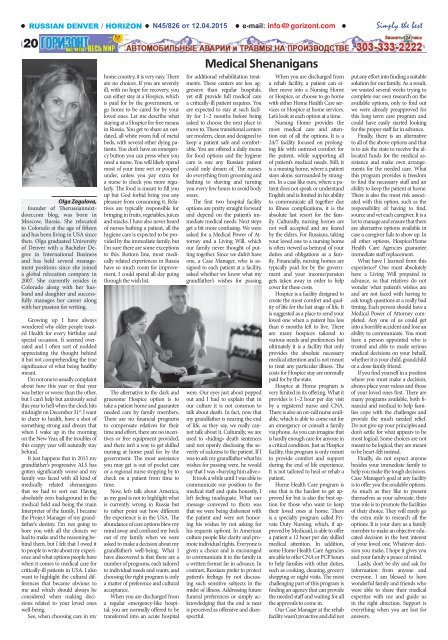Горизонт N45/826
Горизонт (газета) — (Gorizont англ. Horizon ) первая и наиболее влиятельная газета, издающаяся на русском языке в штатеКолорадо, США. Еженедельник, выходит по пятницам, формат Таблоид, 128 цветных и чернобелых страниц, распространяется в городах, составляющих метрополию Денвера (Большой Денвер), и в других населенных пунктах штата Колорадо от графства Саммит до графства Эль—Пасо. Полная электронная версия газеты «Горизонт» доступна в сети Интернет. Подробнее http://en.wikipedia.org/wiki/Gorizont_(newspaper)
Горизонт (газета) — (Gorizont англ. Horizon ) первая и наиболее влиятельная газета, издающаяся на русском языке в штатеКолорадо, США. Еженедельник, выходит по пятницам, формат Таблоид, 128 цветных и чернобелых страниц, распространяется в городах, составляющих метрополию Денвера (Большой Денвер), и в других населенных пунктах штата Колорадо от графства Саммит до графства Эль—Пасо. Полная электронная версия газеты «Горизонт» доступна в сети Интернет. Подробнее http://en.wikipedia.org/wiki/Gorizont_(newspaper)
Create successful ePaper yourself
Turn your PDF publications into a flip-book with our unique Google optimized e-Paper software.
RUSSIAN DENVER / HORIZON<br />
20<br />
Olga Zagulova,<br />
founder of Therussiannextdoor.com<br />
blog, was born in<br />
Moscow, Russia. She relocated<br />
to Colorado at the age of fifteen<br />
and has been living in USA since<br />
then. Olga graduated University<br />
of Denver with a Bachelor Degree<br />
in International Business<br />
and has held several management<br />
positions since she joined<br />
a global relocation company in<br />
2007. She currently resides in<br />
Colorado along with her husband<br />
and daughter and successfully<br />
manages her career along<br />
with her passion for writing.<br />
Growing up I have always<br />
wondered why older people toasted<br />
Health for every birthday and<br />
special occasion. It seemed overrated<br />
and I often sort of nodded<br />
appreciating the thought behind<br />
it but not comprehending the true<br />
significance of what being healthy<br />
meant.<br />
I’m not one to usually complaint<br />
about how this year or that year<br />
was better or worse than the other,<br />
but I can’t help but anxiously send<br />
this year to hell when the clock hits<br />
midnight on December 31 st . I want<br />
to cheer to health, have a shot of<br />
something strong and dream that<br />
when I wake up in the morning<br />
on the New Year, all the troubles of<br />
this crappy year will naturally stay<br />
behind.<br />
It just happens that in 2015 my<br />
grandfather’s progressive ALS has<br />
gotten significantly worse and my<br />
family was faced with all kind of<br />
medically related shenanigans<br />
that we had to sort out. Having<br />
absolutely zero background in the<br />
medical field and being the main<br />
Interpreter of the family, I became<br />
the Project Manager of my grandfather’s<br />
destiny. I’m not going to<br />
bore you with all the choices we<br />
had to make and the reasoning behind<br />
them, but I felt that I owed it<br />
to people to write about my experience<br />
and what options people have<br />
when it comes to medical care for<br />
critically-ill patients in USA. I also<br />
want to highlight the cultural differences<br />
that became obvious to<br />
me and which should always be<br />
considered when making decisions<br />
related to your loved ones<br />
well-being.<br />
See, when choosing care in my<br />
home country, it is very easy. There<br />
are no choices. If you are severely<br />
ill, with no hope for recovery, you<br />
can either stay at a Hospice, which<br />
is paid for by the government, or<br />
go home to be cared for by your<br />
loved ones. Let me describe what<br />
staying at a Hospice for free means<br />
in Russia. You get to share an outdated,<br />
all white room full of metal<br />
beds, with several other dying patients.<br />
You don’t have an emergency<br />
button you can press when you<br />
need a nurse. You will likely spend<br />
most of your time wet or pooped<br />
under, unless you pay extra for<br />
a nurse to check you more regularly.<br />
The food is meant to fill you<br />
up but God forbid bring you any<br />
pleasure from consuming it. Relatives<br />
are typically responsible for<br />
bringing in fruits, vegetables, juices<br />
and snacks. I have also never heard<br />
of nurses bathing a patient, all the<br />
hygiene care is expected to be provided<br />
by the immediate family, but<br />
I’m sure there are some exceptions<br />
to this. Bottom line, most medically<br />
related experiences in Russia<br />
have so much room for improvement,<br />
I could spend all day going<br />
through the wish list.<br />
The alternative to the dark and<br />
gruesome Hospice option is to<br />
take a patient home and guarantee<br />
needed care by family members.<br />
There are no financial programs<br />
to compensate relatives for their<br />
time and effort, there are no incentives<br />
or free equipment provided,<br />
and there isn’t a way to get skilled<br />
nursing at home paid for by the<br />
government. The most assistance<br />
you may get is out of pocket care<br />
or a regional nurse stopping by to<br />
check on a patient from time to<br />
time.<br />
Now, let’s talk about America,<br />
as my goal is not to highlight what<br />
is currently wrong in Russia but<br />
to rather point out how different<br />
the experience is in the USA. The<br />
abundance of care options blew my<br />
mind away and confused my heck<br />
out of my family when we were<br />
asked to make a decision about my<br />
grandfather’s well-being. What I<br />
have discovered is that there are a<br />
number of programs, each tailored<br />
to individual needs and wants, and<br />
choosing the right program is only<br />
a matter of preference and cultural<br />
acceptance.<br />
When you are discharged from<br />
a regular emergency-like hospital,<br />
you are normally offered to be<br />
transferred into an acute hospital<br />
<strong>N45</strong>/<strong>826</strong> от 12.04.2015 e-mail: info@gorizont.com Simply the best<br />
Medical Shenanigans<br />
for additional rehabilitation treatments.<br />
These centers are less aggressive<br />
than regular hospitals,<br />
yet still provide full medical care<br />
a critically-ill patient requires. You<br />
are expected to stay at such facility<br />
for 1–2 months before being<br />
asked to choose the next place to<br />
move to. These transitional centers<br />
are modern, clean and designed to<br />
keep a patient safe and comfortable.<br />
You are offered a daily menu<br />
for food options and the hygiene<br />
care is one any Russian patient<br />
could only dream of. The nurses<br />
do everything from grooming and<br />
bathing to shaving and turning<br />
you every few hours to avoid body<br />
soars.<br />
The first two hospital facility<br />
options are pretty straight forward<br />
and depend on the patient’s immediate<br />
medical needs. Next steps<br />
get a bit more confusing. We were<br />
asked for a Medical Power of Attorney<br />
and a Living Will, which<br />
our family never thought of putting<br />
together. Since we didn’t have<br />
one, a Case Manager, who is assigned<br />
to each patient at a facility,<br />
asked whether we know what my<br />
grandfather’s wishes for passing<br />
were. Our eyes just about popped<br />
out and I had to explain that in<br />
our culture it is not common to<br />
talk about death. In fact, now that<br />
my grandfather is nearing the end<br />
of life, as they say, we really cannot<br />
talk about it. Culturally, we are<br />
used to «hiding» death sentences<br />
and not openly disclosing the severity<br />
of sickness to the patient. If I<br />
was to ask my grandfather what his<br />
wishes for passing were, he would<br />
say that I was «burying him alive.»<br />
It took a while until I was able to<br />
communicate our position to the<br />
medical staff and quite honestly, I<br />
left feeling inadequate. What our<br />
message conveyed to them was<br />
that we were being dishonest with<br />
the patient and were not honoring<br />
his wishes by not asking for<br />
his requests upfront. In American<br />
culture people like clarity and promote<br />
individual rights. Everyone is<br />
given a choice and is encouraged<br />
to communicate it to the family in<br />
a written format far in advance. In<br />
contrast, Russians prefer to protect<br />
patient’s feelings by not discussing<br />
such sensitive subjects in the<br />
midst of illness. Addressing future<br />
funeral preferences or simply acknowledging<br />
that the end is near<br />
is perceived as offensive and disrespectful.<br />
When you are discharged from<br />
a rehab facility, a patient can either<br />
move into a Nursing Home<br />
or Hospice, or choose to go home<br />
with either Home Health Care services<br />
or Hospice at home services.<br />
Let’s look at each option at a time.<br />
Nursing Home provides the<br />
most medical care and attention<br />
out of all the options. It is a<br />
24/7 facility focused on prolonging<br />
life with outmost comfort for<br />
the patient, while supporting all<br />
of patient’s medical needs. Still, it<br />
is a nursing home, where a patient<br />
stays alone, surrounded by strangers.<br />
In a case like ours, where a patient<br />
does not speak or understand<br />
English and is limited in his ability<br />
to communicate all together due<br />
to illness complications, it is the<br />
absolute last resort for the family.<br />
Culturally, nursing homes are<br />
not well accepted and are feared<br />
by the elders. For Russians, taking<br />
your loved one to a nursing home<br />
is often viewed as betrayal of your<br />
duties and obligations as a family.<br />
Financially, nursing homes are<br />
typically paid for by the government<br />
and your income/pension<br />
gets taken away in order to help<br />
cover for these costs.<br />
Hospice is a facility designed to<br />
create the most comfort and quality<br />
of life for the last stage of life. It<br />
is suggested as a place to send your<br />
loved one when a patient has less<br />
than 6 months left to live. There<br />
are many hospices tailored to<br />
various needs and preferences but<br />
ultimately it is a facility that only<br />
provides the absolute necessary<br />
medical attention and is not meant<br />
to treat any particular illness. The<br />
costs for Hospice stay are normally<br />
paid for by the state.<br />
Hospice at Home program is<br />
very limited in its offering. What it<br />
provides is 1–2 hour per day visit<br />
by a registered nurse and CNA.<br />
There is also an on-call nurse available,<br />
which is able to come out for<br />
an emergency or consult a family<br />
via phone. As you can imagine that<br />
is hardly enough care for anyone in<br />
a critical condition. Just as Hospice<br />
facility, this program is only meant<br />
to provide comfort and support<br />
during the end of life experience.<br />
It is not tailored to heal or rehab a<br />
patient.<br />
Home Health Care program is<br />
one that is the hardest to get approved<br />
for but is also the best option<br />
for those who want to keep<br />
their loved ones at home. There<br />
is a specialty program called Private<br />
Duty Nursing, which, if approved<br />
by Medicaid, is able to offer<br />
a patient a 12 hour per day skilled<br />
medical attention. In addition,<br />
some Home Health Care Agencies<br />
are able to offer CNA or PCP hours<br />
to help families with other duties,<br />
such as cooking, cleaning, grocery<br />
shopping or night visits. The most<br />
challenging part of this program is<br />
finding an agency that can provide<br />
the needed staff and waiting for all<br />
the approvals to come in.<br />
Our Case Manager at the rehab<br />
facility wasn’t proactive and did not<br />
put any effort into finding a suitable<br />
solution for our family. As a result,<br />
we wasted several weeks trying to<br />
complete our own research on the<br />
available options, only to find out<br />
we were already preapproved for<br />
this long term care program and<br />
could have easily started looking<br />
for the proper staff far in advance.<br />
Finally, there is an alternative<br />
to all of the above options and that<br />
is to ask the state to receive the allocated<br />
funds for the medical assistance<br />
and make own arrangements<br />
for the needed care. What<br />
this program provides is freedom<br />
to find the necessary staff and an<br />
ability to keep the patient at home.<br />
There is also the most risk associated<br />
with this option, such as the<br />
responsibility of having to find,<br />
source and vet each caregiver. It is a<br />
lot to manage and ensure that there<br />
are alternative options available in<br />
case a caregiver fails to show up. In<br />
all other options, Hospice/Home<br />
Health Care Agencies guarantee<br />
immediate staff replacement.<br />
What have I learned from this<br />
experience? One must absolutely<br />
have a Living Will prepared in<br />
advance, so that relatives do not<br />
wonder what patient’s wishes are<br />
and are not faced with having to<br />
ask tough questions at a really bad<br />
timing. Each person should have a<br />
Medical Power of Attorney completed.<br />
Any one of us could get<br />
into a horrible accident and lose an<br />
ability to communicate. You must<br />
have a person appointed who is<br />
trusted and able to made serious<br />
medical decisions on your behalf,<br />
whether it is your child, grandchild<br />
or a close family friend.<br />
If you find yourself in a position<br />
where you must make a decision,<br />
always place your values and those<br />
of your loved ones first. There are<br />
many programs available, both financial<br />
and medical to help families<br />
cope with the challenges and<br />
provide the much needed relief.<br />
Do not give up your principles and<br />
don’t settle for what appears to be<br />
most logical. Some choices are not<br />
meant to be logical, they are meant<br />
to be heart-felt instead.<br />
Finally, do not expect anyone<br />
besides your immediate family to<br />
help you make the tough decisions.<br />
Case Manager’s goal at any facility<br />
is to offer you the available options.<br />
As much as they like to present<br />
themselves as your advocate, their<br />
true role is to promote the facilities<br />
of their choice. They will rarely go<br />
the extra mile to research all the<br />
options. It is your duty as a family<br />
member to make an objective educated<br />
decision in the best interest<br />
of your loved one. Whatever decision<br />
you make, I hope it gives you<br />
and your family a peace of mind.<br />
Lastly, don’t be shy and ask for<br />
information from anyone and<br />
everyone. I am blessed to have<br />
wonderful family and friends who<br />
were able to share their medical<br />
expertise with me and guide us<br />
in the right direction. Support is<br />
everything when you are lost for<br />
answers.

















